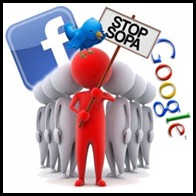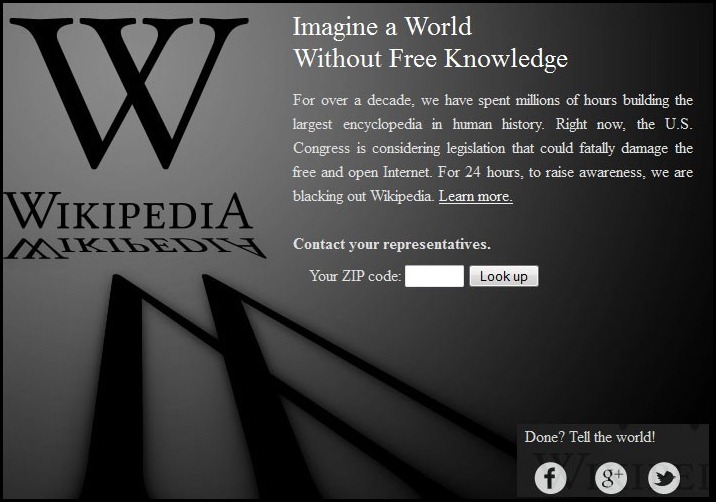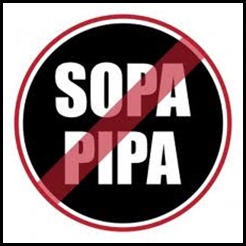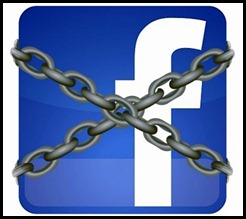 Over the past few months, the netizens have been irked about various developments surrounding the much talked about Anti piracy acts and censorship debate. Leading the pack are PIPA and SOPA. Various other issues have also cropped up on similar lines. Concerns pertaining to censorship of social media in India being one of them. For the ease of understanding let’s break them down and do a quick recap on what has been causing the stir in the cyber space.
Over the past few months, the netizens have been irked about various developments surrounding the much talked about Anti piracy acts and censorship debate. Leading the pack are PIPA and SOPA. Various other issues have also cropped up on similar lines. Concerns pertaining to censorship of social media in India being one of them. For the ease of understanding let’s break them down and do a quick recap on what has been causing the stir in the cyber space.
The PIPA-SOPA effect
PIPA (Protect Intellectual Property Act) and SOPA (Stop Online Piracy Act) were both bills introduced in the US Congress. Introduced by Patrick Leahy on May 12, 2011, PIPA is a law enactment (awaiting a sanction) that aims at providing the US government and copyright holders with additional tools to combat websites that cater to infringement or counterfeiting goods, especially outside the US.
The PROTECT IP Act says that an "information location tool shall take technically feasible and reasonable measures, as expeditiously as possible, to remove or disable access to the Internet site associated with the domain name set forth in the order. In addition, it must delete all hyperlinks to the offending "Internet site"
The Stop Online Privacy Act was introduced by Lamar S. Smith on October 26, 2011 on the lines of the previously launched PIPA months ago. This bill was propounded with similar aims to fight online trafficking in contented Intellectual Property and counterfeited goods. Provisions include the requesting of court orders to bar advertising networks and payment facilities from conducting business with infringing websites, and search engines from linking to the sites, and court orders requiring Internet service providers to block access to the sites. The law would expand existing criminal laws to include unauthorized streaming of copyright material, imposing a maximum penalty of five years in prison.
What followed next and what’s lying ahead:
Aided by a visible support from entertainment related groups like the MPAA (Motion Picture Association of America) and National Music Publishers Association, major pharmaceutical corporations, etc. along with the U.S. Chamber of Commerce and other law enforcement agencies, the PIPA and SOPA picked up steam. But was quickly opposed by a widespread opposition from the biggies of the internet namely, Wikipedia, Facebook, Google, Amazon.com, Yahoo!, Twitter et al.
In the weeks that followed, things seemed to have stalled for the activists. Wikipedia (English) called for a blanket ban on what the world would be like without access to free knowledge. Google also did their bit by creating a dedicated landing page (with a blackened logo) on 18th of January, 2011, the day to be remembered in recent times as the day the internet went dark. Social networking giant Facebook voiced its concern over the Act considering the huge user base of Facebook and taking into account that majority of them are based outside the geographical boundary of USA. It stated it is a nearly impossible task to monitor what a single user is uploading. Facebook and many other social networking sites are platforms and not content filtering sites.
 Wikipedia Blackout on 18th January as a support to ban PIPA & SOPA
Wikipedia Blackout on 18th January as a support to ban PIPA & SOPA
A recent setback of sorts was Twitter’s (a youth oriented social networking platform that has in its basic fabric, promoting freedom of expression, 140 characters at a time) has now put a system in a place to have region specific censorship of its tweets. Considering the fresh infusion of US$ 300 million from a Saudi investment holding company one could only speculate why. This rather surprising move by twitter was opposed by major activists like those based out of Egypt and Libya where Twitter played a major role in ousting the then existing government tyranny just about a year ago. Also, a Twitter blackout day was observed on January 28th, 2012 to protest against Twitters decision.
On the Indian shores
Closer home, In India, the limited but an ever growing internet audience is fighting its own battle against the government’s censorship policy that has proposals to add more clauses in the Information Technology (IT) Act specifically targeting the content that is posted online on social networking sites at large. This includes previously enlisted clauses like monitoring of digital signatures, security and hacking.
Following a string of posts that have surfaced up lately on various social networking websites like Facebook, Twitter, ibibo etc. where strong sentiments are made vocal by exploiting various tools like pictures, videos, updates, notes, tweets etc. the government is looking to pull the chord on the social media platforms.
This has made some 80 million Indians very unhappy. With all the censorship and the unrest that has been going on with various people led campaigns and the support garnered through social media, this has been taken as a way of governments attempt at curtailing the fundamental right of freedom to expression. Many have suggested that such a step is like killing the messenger.
Cause for concern?
For any brand, such a step of preventing free speech or even an open platform for expression is a cause of concern. No other platform gives you such easy access to more than a billion people with such little investment. Although PIPA and SOPA acts have been put to rest for now, the fight in India is still going on. Many have said that the Indian government cannot take a totalitarian stand like China.
Also, the government of India would have better sense to go back to 80s when foreign MNCs were asked to leave the country. With Facebook IPO just round the corner, killing investment opportunities with such giants would eventually harm the country’s economics. Something which the government can’t afford.


